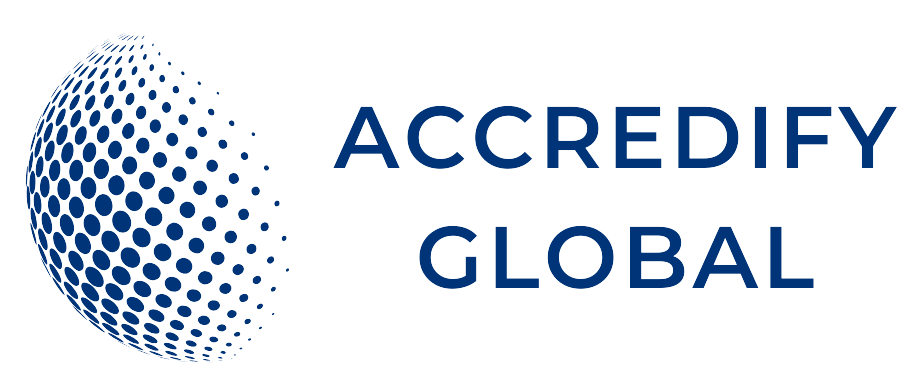ISO Certification for Energy Industry | ISO 9001, 14001, 45001, 50001 , 27001 | Accredify Global

The energy industry deals with the extraction, processing, and distribution of energy resources. These industries have a great impact on our environment and guide the carbon emissions of a nation.
Since the Industrial Revolution, factories for the production of products have been on the constant rise. A country’s growth and development have a direct relationship with its level of industrialization. However, this development comes with a great price on the environment as overexploitation of energy resources for running out vast industries is the major cause of the rise in global temperature. It can be said that the energy industries stand at the junction of development and the environment. This is the very reason that such industries should ensure the quality and efficiency of their processes. In addition to that, the energy industry employs a large population. Therefore, their safety and wellbeing is of great importance.
How is ISO Certification helpful for Energy industry?
ISO certification, particularly the ISO 50001 standard for Energy Management Systems, is highly beneficial for the energy industry by providing a structured framework to improve energy efficiency, reduce costs, and demonstrate a commitment to sustainability by systematically monitoring and optimizing energy consumption across operations, which can lead to increased customer trust and potential competitive advantage.
Why do the Energy industry need ISO Certification?
Energy industries need ISO certification, particularly ISO 50001, to demonstrate their commitment to energy efficiency, reduce costs by optimizing energy consumption, lower greenhouse gas emissions, and gain a competitive advantage in the market by proving their environmental responsibility through standardized practices and continual improvement processes.
One can feel the ultimate need for ISO Certifications for the Energy industry in each and every stage of their services. In that regard some points are highlighted below:
- Having ISO certifications for the railway sectors will help you to get international recognition as it boosts your reputation all over the world.
- ISO Standards help the Energy sectors improve their organizational revenues and earn maximum profits for organizational benefits.
- ISO Certifications are applicable for almost all kinds of Energy units regardless of their size, type, or process.
ISO certification helps to elevate your company’s reputation by demonstrating that you are committed to meeting internationally recognized standards of excellence.
Which standards or ISO certificates are required for the Education?
In this regard, the International Organization for Standardization publishes several ISO certifications for the energy industry that ensure the quality and safety of products as well as the efficiency of processes. Some of them include:
ISO 9001:2015 Standard
ISO 9001 certification is an internationally accredited standard for quality management systems (QMS). This standard helps in the accomplishment and maintenance of quality management systems (QMS) in your organization so that the quality of your products, as well as processes, are top-notch.
ISO 14001:2015 Standard
ISO 14001 Certification is the general standard for Environment Management Systems. ISO 14001 standard helps in the execution of Environmental Management Systems (EMS) in your organization to make sure that your products and services are not causing environmental damage. It also helps your organization to minimize the harmful impacts of your processes in the environment.
ISO 45001:2018 Standard
ISO 45001 Certification is an internationally required standard which is probably the most important one for your organization, as it ensures the safety and wellbeing of your manpower, contractors as well as the nearby population. This standard helps in the implementation of Occupational Health and Safety Management Systems (OHSMS) in your organization.
ISO 27001:2022 Standard
ISO 27001 Certification is a globally recognized standard that helps in implementing Information Safety Management Systems (ISMS) in your organization that would protect the data stored within your premises from any breach or loss.
ISO 50001:2018 Standard
ISO 50001 Certification is an internationally accepted standard for energy management systems. This ISO standard for the industry helps to improve your overall energy management and can reduce costs and operating expenses.
ISO 17025:2017 Standard
Ensures accurate testing, analysis, and laboratory quality. Reduces testing errors by 50%, improving product consistency.Essential for R&D and analytical laboratories.
ISO 55001:2024 Standard
Optimizes the lifespan of energy assets like turbines, grids, and pipelines.Reduces maintenance costs by 25%, increasing efficiency. Ensures better risk management in energy asset handling.
ISO 19650-6:2025 Standard
Supports digital transformation in energy infrastructure projects.Improves efficiency in energy construction and maintenance. Essential for smart energy systems and renewable power plants.
ISO 22301:2019 Standard
Ensures defence operations remain functional during crises. Reduces downtime by 60%, enhancing resilience.Essential for critical military and national security operations.
ISO 31000:2018 Standard
Identifies and mitigates defence industry risks.Enhances decision-making in high-risk military environments.Reduces security threats and operational disruptions.
ISO 26000:2010 Standard
Encourages ethical business practices in the energy sector.Ensures compliance with corporate social responsibility (CSR) guidelines.Builds trust with stakeholders and customers.
ISO Certification process for Energy Industry
- Application & contract
- Audit team Assignment
- Document view
- Certification Audit Independent review
- Notification of Certification
- Surveillance audit
- Re-Assessment
The certification process goes further. click here to view the next steps to the ISO certification Process
ISO certifications have huge significance across a varied range of industries. They not only help to improve the processes within the organization but also ensure a smooth flow of services throughout the supply chain.
Services
Benefits of ISO Certification for Energy industry
The Energy industry is indeed the backbone of any economy. It is also one of the most infamous sectors when it comes to causing irreparable damage to the environment. Thus, with the help of ISO Certification, these industries can maintain the balance between development and environmental sustainability to standardize their system and processes according to internationally recognized and accepted norms.
- Reduction of operating costs by streamlining of processes
- Improvement in efficiencies by effective implementation of management systems.
- Reduced carbon footprint by optimum utilization of resources
- Compliance to the regulations of the land
- A demonstration of business’s commitment to meeting customer’s requirements.
- Enhanced reputation helps in gaining more business.
Why Choose Accredify Global for ISO Certification?
Accredify Global is a leading ISO certification body, operating in 95+ countries, offering:
- Certified auditors with expertise in the education industry.
- 30% faster certification process than competitors.
- Tailored compliance solutions.
- 24/7 support for audits, quality management & compliance.
- Affordable pricing & flexible certification plans.
FAQs
What are the ISO requirements for the Energy industry?
Answer: The most commonly required standards that are applicable for Energy Industries are as listed below:
How do we become ISO Certified for the Energy industry?
Answer: Achieving ISO Certification is no big deal in today’s upgraded systems.
Firstly, you need to prepare all the relevant information about your company in a systematized way (It is always best and safe to hire a legal consultant.)
Secondly, you need to document all the relevant information about your business.
Thirdly, you have to implement all the documented information in your organization.
Fourthly, get ready for the internal audits which are performed first during the certification process and then periodically after.
Lastly, if the certifying body approves your management system then you will be awarded the required ISO standard.
How long is an ISO certificate valid for?
Answer: An ISO Certificate is valid for 3 years. And during this time period of 3 years, a surveillance audit is conducted on an annual basis to ensure that ISO quality standards are being maintained by the organization.
How can I apply for ISO Certification for the Energy industry?
Answer: Achieving ISO Certification Energy Industry for is no big deal in today’s upgraded systems. The basic steps to get ISO Certification for Energy Industry are as follows: > Firstly, select the type of ISO certification you want for your Energy Industries. > Secondly, selecting a recognized and credible ISO certification body (ISO Registrar) > Thirdly, make an application in the prescribed form which should include liability issues, confidentiality, and access rights. > Fourthly, the ISO certification body will review all the documents related to various policies and procedures being followed in the organization. If there are any existing gaps, the applicant has to prepare an action plan to eliminate these gaps. > Then, the ISO registrar will conduct a physical onsite inspection to audit the changes made in the organization. As soon as the certifying body approves your management system, you will be awarded the required ISO standard.
How much does it cost for ISO certification?
Answer: Basically, when you approach a certifying body for ISO Certification and they approve your management systems and all your processes, they will then quote an amount for the certificate. Moreover, the cost for achieving ISO certification depends mostly on your organization, such as the no. of employees in your organization, No. of branches your organization has, and many more.
